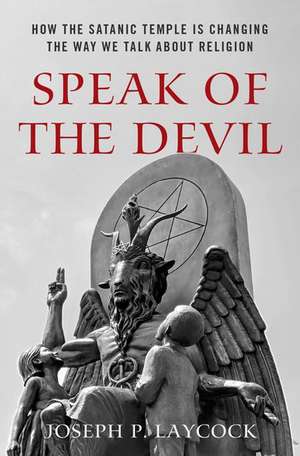Speak of the Devil: How The Satanic Temple is Changing the Way We Talk about Religion
Autor Joseph P. Laycocken Limba Engleză Hardback – 2 apr 2020
Preț: 266.93 lei
Nou
Puncte Express: 400
Preț estimativ în valută:
51.09€ • 55.52$ • 42.95£
51.09€ • 55.52$ • 42.95£
Carte disponibilă
Livrare economică 31 martie-14 aprilie
Livrare express 15-21 martie pentru 35.30 lei
Preluare comenzi: 021 569.72.76
Specificații
ISBN-13: 9780190948498
ISBN-10: 0190948493
Pagini: 272
Dimensiuni: 163 x 236 x 25 mm
Greutate: 0.52 kg
Editura: Oxford University Press
Colecția OUP USA
Locul publicării:New York, United States
ISBN-10: 0190948493
Pagini: 272
Dimensiuni: 163 x 236 x 25 mm
Greutate: 0.52 kg
Editura: Oxford University Press
Colecția OUP USA
Locul publicării:New York, United States
Recenzii
Courses on topics ranging from religion and law to religious protest to general surveys of American religion will be enriched by the inclusion of this exciting text.
Speak of the Devil is a must-read for scholars of religion. Laycock rightly frames TST (The Satanic Temple) as provoking consequential questions of classification, religious freedom, and national belonging.
Speak of the Devil ranks its author among influential scholars of contemporary Satanism ... Laycock's work is likely to appeal to both scholars and a broader audience by presenting a fluent, readable, and properly contextualized analysis of the development of The Satanic Temple.
Recommended.
Joseph Laycock has written an outstanding treatment of one of the most misunderstood new religious movements...The book is well-written and impeccably documented. In addition to producing a fine introduction to TST, Laycock introduces us to a host of important contemporary cultural theorists, religion scholars, and legal experts working at the interface of politics and religion. This book will be valuable to anyone who teaches world religions/new religious movements, or anyone seeking to understand legal issues related to religion in the public square.
Laycock's book produces several contributions to the field. His survey of satanic history and its use in popular discourse reveals the extent to which the satanic affinity for performance traces back to earlier Church of Satan figures such as Anton LaVey but also the political activism, militant reactionism, and moral sensationalism of conservative Christians
This volume is highly recommended. Its sections on the history of Satanism and TST may not be of interest to all Christians, but surely to those interested in a study of new religious movements, and Satanism in particular. Even for those who have no interest in Satanism or TST, and who find such subjects off-putting, the discussion of TST's challenges to our assumptions about religion, religious free-dom, and religious pluralism make this an important addition to select Christian libraries.
Laycock's Speak of the Devil is a valuable contribution to the study of modern Satanism and will be of great interest especially to those studying new religious movements, religion in America, and issues of church and state in the United States. Clearly written and well organized, the book would be ideal for graduate seminars not only for its content, but also for its expert blending of history and ethnography in its portrait of an oft-reviled minority religion.
Speak of the Devil is a must-read for scholars of religion. Laycock rightly frames TST (The Satanic Temple) as provoking consequential questions of classification, religious freedom, and national belonging.
Speak of the Devil ranks its author among influential scholars of contemporary Satanism ... Laycock's work is likely to appeal to both scholars and a broader audience by presenting a fluent, readable, and properly contextualized analysis of the development of The Satanic Temple.
Recommended.
Joseph Laycock has written an outstanding treatment of one of the most misunderstood new religious movements...The book is well-written and impeccably documented. In addition to producing a fine introduction to TST, Laycock introduces us to a host of important contemporary cultural theorists, religion scholars, and legal experts working at the interface of politics and religion. This book will be valuable to anyone who teaches world religions/new religious movements, or anyone seeking to understand legal issues related to religion in the public square.
Laycock's book produces several contributions to the field. His survey of satanic history and its use in popular discourse reveals the extent to which the satanic affinity for performance traces back to earlier Church of Satan figures such as Anton LaVey but also the political activism, militant reactionism, and moral sensationalism of conservative Christians
This volume is highly recommended. Its sections on the history of Satanism and TST may not be of interest to all Christians, but surely to those interested in a study of new religious movements, and Satanism in particular. Even for those who have no interest in Satanism or TST, and who find such subjects off-putting, the discussion of TST's challenges to our assumptions about religion, religious free-dom, and religious pluralism make this an important addition to select Christian libraries.
Laycock's Speak of the Devil is a valuable contribution to the study of modern Satanism and will be of great interest especially to those studying new religious movements, religion in America, and issues of church and state in the United States. Clearly written and well organized, the book would be ideal for graduate seminars not only for its content, but also for its expert blending of history and ethnography in its portrait of an oft-reviled minority religion.
Notă biografică
Joseph P. Laycock is an assistant professor of religious studies at Texas State University. His work explores American religious history and new religious movements. He is also a co-editor of the journal Nova Religio.
